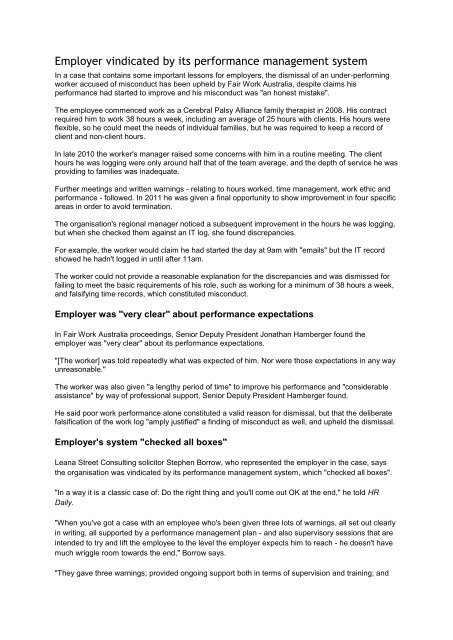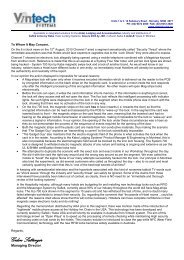Employer vindicated by its performance management system
Employer vindicated by its performance management system
Employer vindicated by its performance management system
You also want an ePaper? Increase the reach of your titles
YUMPU automatically turns print PDFs into web optimized ePapers that Google loves.
<strong>Employer</strong> <strong>vindicated</strong> <strong>by</strong> <strong>its</strong> <strong>performance</strong> <strong>management</strong> <strong>system</strong><br />
In a case that contains some important lessons for employers, the dismissal of an under-performing<br />
worker accused of misconduct has been upheld <strong>by</strong> Fair Work Australia, despite claims his<br />
<strong>performance</strong> had started to improve and his misconduct was "an honest mistake".<br />
The employee commenced work as a Cerebral Palsy Alliance family therapist in 2008. His contract<br />
required him to work 38 hours a week, including an average of 25 hours with clients. His hours were<br />
flexible, so he could meet the needs of individual families, but he was required to keep a record of<br />
client and non-client hours.<br />
In late 2010 the worker's manager raised some concerns with him in a routine meeting. The client<br />
hours he was logging were only around half that of the team average, and the depth of service he was<br />
providing to families was inadequate.<br />
Further meetings and written warnings - relating to hours worked, time <strong>management</strong>, work ethic and<br />
<strong>performance</strong> - followed. In 2011 he was given a final opportunity to show improvement in four specific<br />
areas in order to avoid termination.<br />
The organisation's regional manager noticed a subsequent improvement in the hours he was logging,<br />
but when she checked them against an IT log, she found discrepancies.<br />
For example, the worker would claim he had started the day at 9am with "emails" but the IT record<br />
showed he hadn't logged in until after 11am.<br />
The worker could not provide a reasonable explanation for the discrepancies and was dismissed for<br />
failing to meet the basic requirements of his role, such as working for a minimum of 38 hours a week,<br />
and falsifying time records, which constituted misconduct.<br />
<strong>Employer</strong> was "very clear" about <strong>performance</strong> expectations<br />
In Fair Work Australia proceedings, Senior Deputy President Jonathan Hamberger found the<br />
employer was "very clear" about <strong>its</strong> <strong>performance</strong> expectations.<br />
"[The worker] was told repeatedly what was expected of him. Nor were those expectations in any way<br />
unreasonable."<br />
The worker was also given "a lengthy period of time" to improve his <strong>performance</strong> and "considerable<br />
assistance" <strong>by</strong> way of professional support, Senior Deputy President Hamberger found.<br />
He said poor work <strong>performance</strong> alone constituted a valid reason for dismissal, but that the deliberate<br />
falsification of the work log "amply justified" a finding of misconduct as well, and upheld the dismissal.<br />
<strong>Employer</strong>'s <strong>system</strong> "checked all boxes"<br />
Leana Street Consulting solicitor Stephen Borrow, who represented the employer in the case, says<br />
the organisation was <strong>vindicated</strong> <strong>by</strong> <strong>its</strong> <strong>performance</strong> <strong>management</strong> <strong>system</strong>, which "checked all boxes".<br />
"In a way it is a classic case of: Do the right thing and you'll come out OK at the end," he told HR<br />
Daily.<br />
"When you've got a case with an employee who's been given three lots of warnings, all set out clearly<br />
in writing, all supported <strong>by</strong> a <strong>performance</strong> <strong>management</strong> plan - and also supervisory sessions that are<br />
intended to try and lift the employee to the level the employer expects him to reach - he doesn't have<br />
much wriggle room towards the end," Borrow says.<br />
"They gave three warnings; provided ongoing support both in terms of supervision and training; and
clearly identified all the deficiencies and how they should be addressed going forward."<br />
The fact the worker had a high level of autonomy and flexible hours meant there was an opportunity<br />
to "push the envelope", he says.<br />
The employer's concrete targets, however, including the requirement that therapists spend an<br />
average of 66 per cent of their time with clients, made it clear he was spending insufficient time with<br />
the families he was supposed to support.<br />
Borrow says data relating to how therapists spent their time made it possible to generate graphs<br />
comparing the worker's <strong>performance</strong> with that of his colleagues.<br />
"They were outperforming him all the way through," he says. Further, the data relating to the worker's<br />
hours was logged <strong>by</strong> the worker, "so those arguments came from him".<br />
"It ultimately came down to the requirements being clearly articulated. [The worker] just wasn't able to<br />
attain those."<br />
Towards the end of the <strong>performance</strong> <strong>management</strong> process, the matter was complicated <strong>by</strong> the<br />
discovery the worker had started "fudging" his log to demonstrate improvement.<br />
Even though the worker sought to claim discrepancies were an honest mistake, they demonstrated a<br />
frequency that did not suggest errors of "casual inadvertence", Borrow says.<br />
An attempt to claim the logs were "not official" was also futile.<br />
"They're not official in the sense that they're part of the mechanism for ascertaining what the<br />
appropriate wage should be, but they're official in sense that the employer had applied the directive to<br />
maintain them.<br />
"In doing so, employees should apply themselves diligently and follow lawful and reasonable<br />
directives. So to try and argue you could somehow casually ignore them wouldn't find favour with a<br />
tribunal at all."<br />
Borrow says the case reinforces the fact employers should assiduously apply their own policies. It<br />
makes for a long process, but failure to do so can "get you into strife", he says



